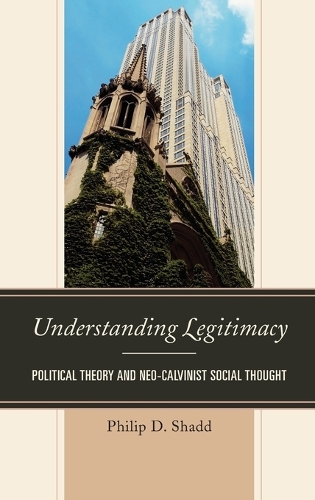
Understanding Legitimacy: Political Theory and Neo-Calvinist Social Thought
(Hardback)
Publishing Details
Understanding Legitimacy: Political Theory and Neo-Calvinist Social Thought
By (Author) Philip D. Shadd
Bloomsbury Publishing PLC
Lexington Books
13th December 2016
United States
Classifications
Professional and Scholarly
Non Fiction
Political ideologies and movements
Social and political philosophy
320.01
Physical Properties
Hardback
216
Width 159mm, Height 238mm, Spine 21mm
503g
Description
In recent years, political theorists have increasingly focused on the question of legitimacy rather than on justice. The question of legitimacy asks: even if legal coercion falls short of being perfectly just, what nonetheless makes it morally legitimate Yet legitimacy remains poorly understood. According to the regnant theory of justificatory liberalism, legitimate legal coercion is based on reasons all reasonable persons can accept and is conceived in terms of a hypothetical procedure. Philip Shadd argues that this view would effectively de-legitimize all laws given its requirement of unanimity; it wrongly suggests that basic rights are outcomes of political procedures rather than checks on such procedures; and it is paternalistic as it substitutes hypothetical persons for actual persons. Where should theorists turn Shadd's perhaps surprising proposal is that they turn to neo-Calvinism. Founded by the Dutch politician, theologian, and social theorist, Abraham Kuyper (1837-1920), neo-Calvinism is a specific variant of Reformed social thought unique for its emphasis on institutional pluralism. It has long theorized themes such as church-state separation, religious diversity, and both individual and institutional liberty. Out of this tradition Shadd reconstructs an alternative framework for legitimacy. The central neo-Calvinist insight is this: legitimacy is a function of preventing basic wrongs. The book develops this insight in terms of three ideas. First, the wrongs that legitimate regimes must prevent are violations of objective natural rights. Second, these rights and wrongs presuppose some or another view of basic human flourishing. Third, Shadd suggests we understand these rights and wrongs as being exogenous. That is, they are not social constructions, but arise outside of human societies even while applying to them. While based in a religious tradition of thought, religious intolerance is no part of this neo-Calvinist theory of legitimacy and, in fact, runs contrary to neo-Calvinisms distinctive institutional pluralism. But only by theorizing legitimacy along the lines Shadd suggests can we make sense of convictions such as that some legal coercion is legitimate even amidst disagreement and that paternalistic coercion is illegitimate. Neo-Calvinism offers a better framework for understanding legitimacy. This book will be of particular interest to secular theorists focusing on themes of political legitimacy, public reason, justificatory (or political) liberalism, or the work of John Rawls, and to religious theorists focused on theories of church-state separation, institutional pluralism, and religious diversity.
Reviews
Shadds mapping, nuanced definitions, forensic clarification, helpful use of acronyms, fine distinctions, and explication of views he disagrees with makes the volume a model of what one expects from careful philosophical work. Also felicitous is Shadds sections at the end of chapters wherein he answers possible objections to his view. Such self-critical reflection strengthens Shadds argument. More specifically, Shadds proficiency in neo-Calvinist social thought by which he identifies distinctions between neo-Calvinist theorists is impressive.... By focusing the discussion around legitimacy, Shadd has not only brought new insights and deepened the debate, he has done so by exposing how a less known tradition of Christian social thought presents a substantial challenge to the dominant theory of legitimacy. * Journal of Church and State *
This book works on many levels. It provides a brilliant critique of justificatory liberalism, exposing its many flaws, and it illustrates the rich resources of the neo-Calvinist perspective for politics. It provides a great example of how to debate with political theories from a Christian perspective. I hope it will be widely read and not just by neo-Calvinists. * An Accidental Blog *
This excellent, clearly-written book breaks important new ground in debates over the contested concept of political legitimacy. Forensically exposing serious philosophical deficiencies in the dominant justificatory liberal account of legitimacy, this book creatively mines a novel and unexpected source neo-Calvinist political thought for fresh resources to reframe and reconstruct legitimacy more in accord with our widely-held intuitions about natural justice. In doing so he helps repair the fragile intellectual foundations of our liberal political orders and sheds new light on the very point of democratic consent. Philip Shadd is an important new contributor to the much-needed dialog between mainstream political philosophy and Christian political theology. -- Jonathan Chaplin, Kirby Laing Institute for Christian Ethics
According to public reason liberalism, the exercise of political power must be acceptable to the full range of reasonable religious and philosophical doctrines that exist in a modern democracy. Phil Shad argues that the practical implications of this view are deeply at odds with common sense moral commitments. He offers an intriguing neo-Calvinist alternative, according to which legitimacy depends not on unanimous acceptability but on preventing basic wrongs. The result is a powerful challenge to today's dominant form of liberal theory. -- Andrew Lister, Queens University
Author Bio
Philip Shadd is a research associate of the Centre for Philosophy, Religion & Social Ethics (CPRSE) at the Institute for Christian Studies.
